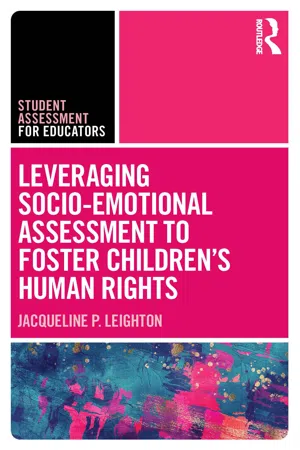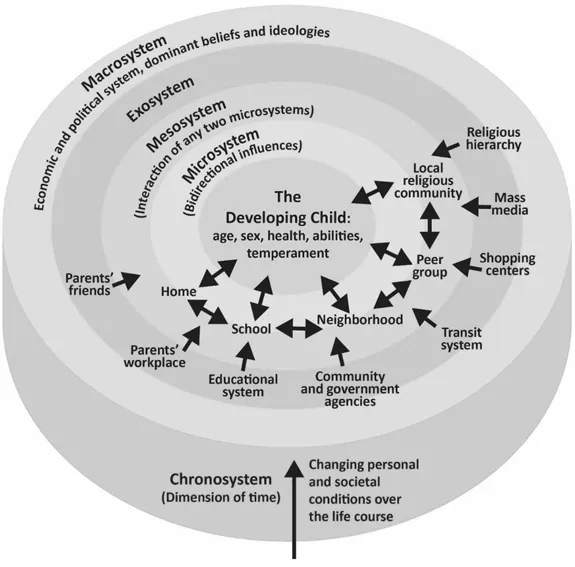
Leveraging Socio-Emotional Assessment to Foster Children’s Human Rights
- 204 pages
- English
- ePUB (mobile friendly)
- Available on iOS & Android
Leveraging Socio-Emotional Assessment to Foster Children’s Human Rights
About this book
Leveraging Socio-Emotional Assessment to Foster Children's Human Rights focuses on teaching and assessing students' social and emotional attributes within the broader context of children's rights. School teachers are charged with more than just academic development – every day, they have opportunities to guide children toward humanistic, justice-orientated perspectives and to serve as role models and relationship-builders. Built from a growing body of research on the benefits of socio-emotional learning and assessment in classrooms, this book prepares pre-service and in-service teachers to take on the shifting mindset that is required for learning processes that promote dignity and respectful relations in the classroom. These concise, accessible chapters address the value and effects of positive student-teacher relationships, classroom implementation and assessment methods, student- and parent-inclusive feedback and more.
Frequently asked questions
- Essential is ideal for learners and professionals who enjoy exploring a wide range of subjects. Access the Essential Library with 800,000+ trusted titles and best-sellers across business, personal growth, and the humanities. Includes unlimited reading time and Standard Read Aloud voice.
- Complete: Perfect for advanced learners and researchers needing full, unrestricted access. Unlock 1.4M+ books across hundreds of subjects, including academic and specialized titles. The Complete Plan also includes advanced features like Premium Read Aloud and Research Assistant.
Please note we cannot support devices running on iOS 13 and Android 7 or earlier. Learn more about using the app.
Information
1 Assessing for Wellness and Children’s Rights

Social and Emotional Assessment in the Context of Children’s Rights: Three Principles
PRINCIPLE 1. There is little cognitive learning for children without social and emotional readiness and wellbeing. Some children need help acquiring the social and emotional competencies, attributes, and/or skills that will help them achieve a state of social and emotional readiness and wellbeing for learning.PRINCIPLE 2. Social and emotional readiness and wellbeing can be formally or informally measured to yield data and inform interpretations about what is in the best interest of students. Students are rights holders in their own learning. These data can be used to facilitate children’s acquisition of social and emotional competencies, attributes and/or skills in classrooms.PRINCIPLE 3. Facilitating children’s acquisition of social and emotional competencies, attributes and/or skills in the classroom requires earning children’s trust. Trust comes about when teachers recognize and nurture their role as secondary attachment figures and as duty bearers in the lives of children.
Socio-Emotional Readiness and Wellbeing, Assessment and Pedagogical Alliances
Definition of Social and Emotional Readiness and Wellbeing
Social and emotional readiness and wellbeing consists of two inter-related processes. The first process is social and involves being part of a group of learners that collaborates for the purpose of achieving learning goals. This process requires students to acquire ways of behaving that allow them to advance their own learning without hindering the learning of others. The second process is emotional and involves developing a sense of awareness about how to use affect – both negative and positive – constructively to achieve desired learning goals. The operationalization of these processes depends on the specific situation and students of interest.
Table of contents
- Cover
- Half Title Page
- Series Page
- Title Page
- Copyright Page
- Dedication
- Table of Contents
- Acknowledgments
- 1 Assessing for Wellness and Children’s Rights
- 2 Trust and Its Effect on Children’s Social and Emotional Wellness
- 3 Assessment Data from a Children’s Rights Approach
- 4 Keeping Your Eye on the Prize to Support Children
- 5 The Assessment Elephant in the Room: When Societies Discount Children
- Index